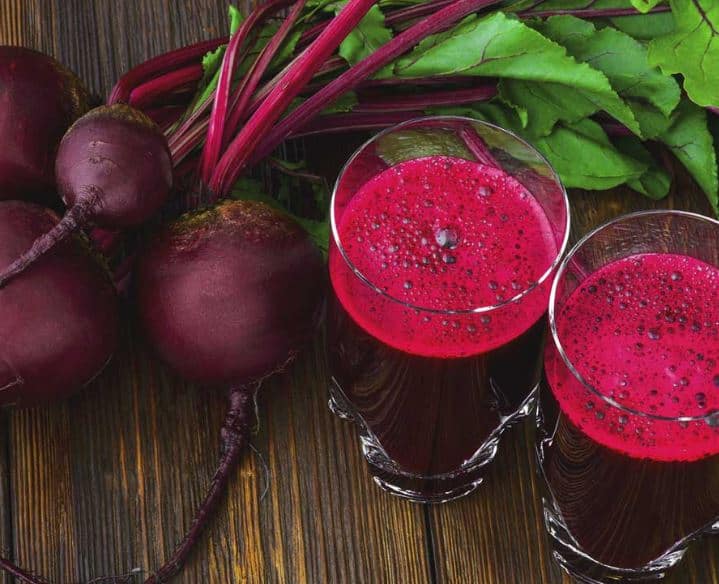Beetroot Juice And Beetroot Juice Benefits Explained

Having been a popular vegetable of choice during the middle ages, the beetroot has grown to evolve into being a familiar ingredient in a number of dishes over time. However, for a long time, only the leaves of the beetroot plant were used for consumption. You would then off the roots as gift to the Gods. At least in the case of the Romans, who would offer the root to Apollo, the sun God.
While the roots are the part of the plant that contains the highest amount of nutrients, vitamins, and active phytochemicals, the leaves of the beetroot plant are considered equally valuable. They contain a higher concentration of certain vitamins and nutrients that make them an important part of any diet.
Beetroot is such a tasty and nutritious source of healthy vitamins, minerals, and other essential dietary supplements. Leaving this tuber off your shopping list would be detrimental to your diet. Beetroot is simply a must-have ingredient for cool summer salads and warm, wintry soups. It has the ability to strengthen your immune system and increase your overall energy levels. Therefore, don’t catch yourself without beetroot throughout the year.
What Is Beetroot?

The garden beet is the most common type of beetroot plant.
The most popular version of beetroot that we know of and regularly consume is the garden beet. It’s the type that we’re most likely to find in supermarkets or greengrocers around the world. The beetroot is generally cultivated over a period of 2 -3 months in the cooler parts of the year. It’s best suited to colder climates where rainfall is even and exposure to direct sunlight is moderate.
It is a good source of iron, calcium, folate, and vitamins A, B, and C. These are ideal for your bodies dietary needs during the colder months of winter. You can include beetroot in your dishes to help strengthen your immune system. Besides boosting your immune system, the vitamins and minerals can help your skin. They also improve your blood flow to lower blood pressure and increase concentration. Beetroot can even fend off oxidative stress damage from harmful chemicals such as free radicals.
Beetroot also has a number of practical uses, in addition to supporting a healthier and more balanced diet. The first and most important use for beetroot was its role as a natural colorant. The natural colorant is known as betalain and it’s still highly popular in the food world today.
Beetroot Juice And Beetroot Powder Explained

Beetroot juice has more nutrients than beetroot powder.
While there are similarities between raw beetroot juice and beetroot powder, it’s best to use both together. The truth is that using both together is the best way to supplement your health. That being said, raw beetroot juice will naturally contain a higher level of nutrients and vitamins than beetroot powder. The powder is processed into the form in which you consume it. This means that it has fewer natural components.
Beetroot juice is high in nitrate which helps to promote the flow of oxygen through blood flow. This juice is usually used for its strong antioxidant properties. It can help regulate the body’s immune system and overall function by helping to flush out toxins and free radicals.
Using beetroot in powder form is generally less effective if you want to maximize the healthy nutrients and vitamins to the body. The method of dehydration that is utilized to get beetroot into powder form often deteriorates many of the active phytochemical cells that hold the nutrients. Using beetroot in its raw form is healthier and a more effective way to introduce the nutrients to your body.
Beetroot For Skin Explained

Beetroot can help clear your complexion.
You can use beetroot to enhance your skin tone and complexion in a number of different ways. It has been a popular addition to the diets of people who are concerned about these things. The most important aspect of beetroot is the high levels of vitamin A, C, B, and iron.
The high levels of vitamin C and A are important for stimulating the release of collagen throughout your body. Collagen is an important protein that your body uses to help encourage cell migration. It allows your skin to regenerate itself on a regular basis.
Vitamin B found in beetroot improves your circulation. The high levels of iron found in the vegetable increase the number of red blood cells in your body, which in turn helps to increase your skin’s natural luster and improve circulation. Both of these are an important part of bringing color back to your skin and boosting your skin’s natural hue.
Beetroot For Hair Explained

Your diet can affect your hair as well.
As many of us know, vitamins A, B, and C are imperative for improving our circulation. While the best way to often treat hair is topical, focusing on your diet is another important step in the process. People often overlook it when deciding on a hair care plan.
Including beetroot in your diet (but more particularly in juice form) on a regular basis is a great way to increase the amount of vitamin C and A in your diet. Additionally, adding beetroot leaves in your juice blend is even better as they’re known to contain 220% of your daily recommended intake of vitamin A.
Vitamin A is one of the most important components in the creation of keratin in your body, the natural proteins that help to strengthen and encourage hair growth. By including foods with large amounts of vitamin A in them into your daily diet, you can strengthen your hair from the inside and therefore build stronger hair follicles over time.
Side Effects Of Beetroot Explained

Beetroot juice in mason jars.
Beetroot is largely considered a healthy vegetable with little to no known side-effects that are serious enough to report. Nevertheless, heavy consumption of the vegetable may change the color of your urine or stool to something of a more reddish color.
This is largely due to the fact that the vegetable contains such high levels of betalain, a natural food colorant that is deep red in color. Betalain tends to have a staining effect which is why you can use it as a non-artificial coloring.
Besides this, the only other precaution that you need to consider when including beetroot in your diet on a regular basis is whether or not you have an allergy to the food or not. While an allergy to beetroot is quite rare, any adverse reactions that may follow after having eaten the vegetable should be monitored. If they progress to a worse condition i.e. you break out in a rash or start suffering from inflammation, you should consider seeing a doctor.
Conclusion
Beetroot has been an important part of our culture for a long time. It has become a favorite ingredient in a number of different dishes over time. Besides being such a tasty natural treat, the vegetable is also incredibly healthy and packed with a wide variety of vitamins and nutrients. This means it leaves you healthy, energized and revitalized. Whether you’re preparing savory dishes, cool summery salads, pastas, decadent desserts or healthy juices and smoothies – beetroot is simply a must-have all year round for a stronger body, healthier skin tone and a bolder head of hair.



